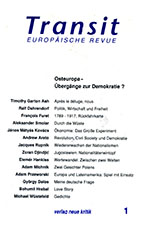Durch die Wüste. Die Dilemmas des Übergangs
Through the Desert. The Dilemmata of Transition
Author(s): Aleksander SmolarContributor(s): Jerzy Gorski (Translator), Klaus Nellen (Translator)
Subject(s): History of Communism, Post-Communist Transformation
Published by: Institut für die Wissenschaften vom Menschen
Keywords: transition; transformation; Bronisław Geremek, Lech Wałesa; Jeffry D. Sachs; Gawril Popow; legacy of communism;
Summary/Abstract: It is taken for granted that the "Other Europe" is out for integration and wants to align itself with the West as quickly as possible in its political institutions, its social organization and in the economy. However, there is currently a lack of serious reflection on the possibilities of such a transition and the restrictions to which it could be subject. Schumpeter's succinctly formulated reservation has lost none of its validity to this day: »Social structures, types and behaviors are coins that do not melt easily. Once shaped, they may last for centuries.” Applied to the post-communist countries of Eastern Europe, this teaches not to underestimate the resilience of certain traditional structures and social behaviors; Pessimism seems appropriate against the hopes of a quick and painless "return" from these countries to Europe. It would be fatal not only for the countries of Eastern Europe that were breaking away from the dictatorship, but for all of Europe if the euphoria of the West, its enthusiasm for the gentle revolutions of 1989 were followed by a phase of fatigue, weariness and averting. Exaggerated hopes and misunderstandings for the implications, the drama and incomparability of the problems facing the post-communist democracies today could quickly weaken the West's willingness to help, which these countries so desperately need (and not only in material terms).
Journal: Transit
- Issue Year: 1990
- Issue No: 01
- Page Range: 065-083
- Page Count: 19
- Language: German

